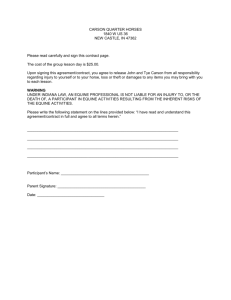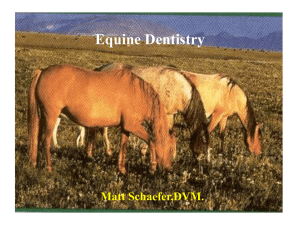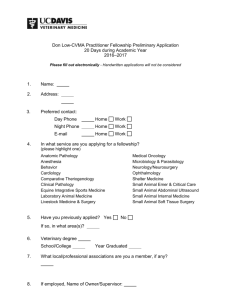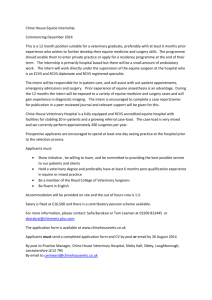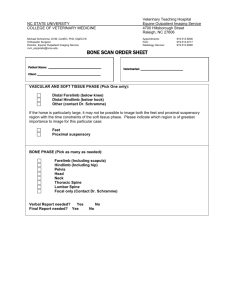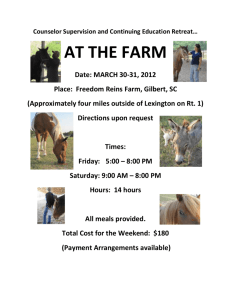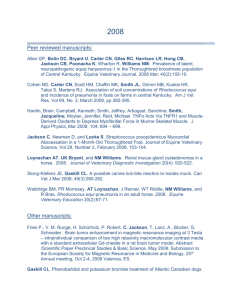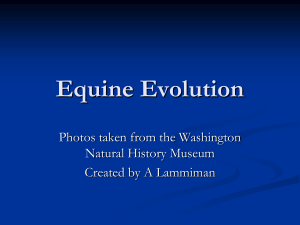fellowship guidelines - Australian College of Veterinary Scientists
advertisement
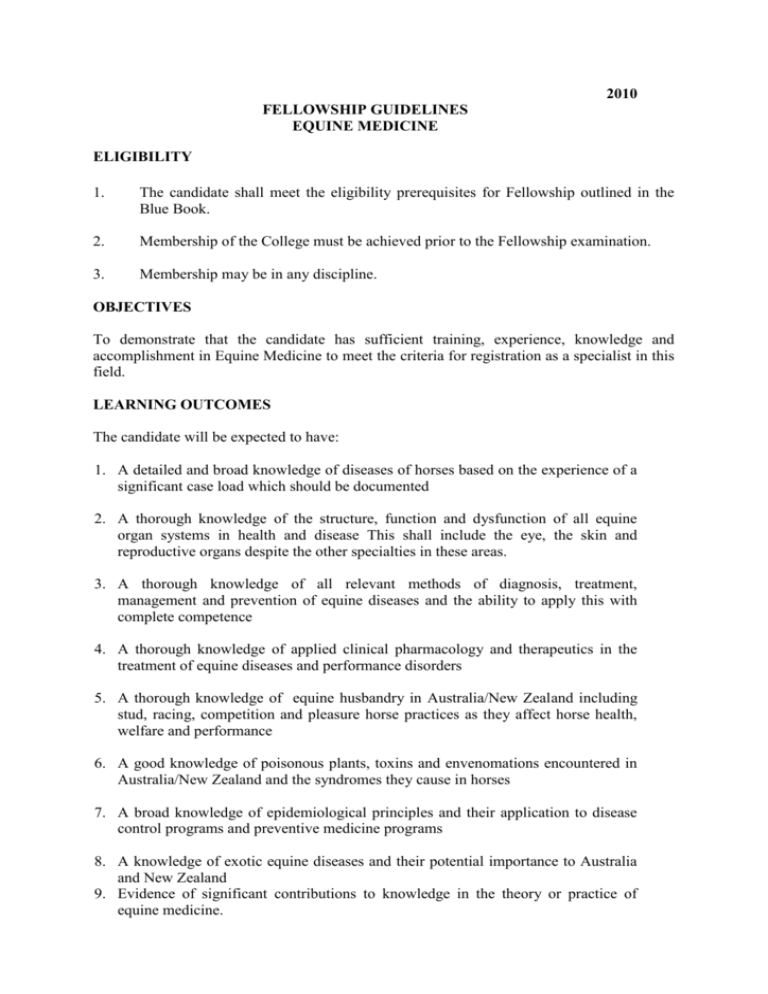
2010 FELLOWSHIP GUIDELINES EQUINE MEDICINE ELIGIBILITY 1. The candidate shall meet the eligibility prerequisites for Fellowship outlined in the Blue Book. 2. Membership of the College must be achieved prior to the Fellowship examination. 3. Membership may be in any discipline. OBJECTIVES To demonstrate that the candidate has sufficient training, experience, knowledge and accomplishment in Equine Medicine to meet the criteria for registration as a specialist in this field. LEARNING OUTCOMES The candidate will be expected to have: 1. A detailed and broad knowledge of diseases of horses based on the experience of a significant case load which should be documented 2. A thorough knowledge of the structure, function and dysfunction of all equine organ systems in health and disease This shall include the eye, the skin and reproductive organs despite the other specialties in these areas. 3. A thorough knowledge of all relevant methods of diagnosis, treatment, management and prevention of equine diseases and the ability to apply this with complete competence 4. A thorough knowledge of applied clinical pharmacology and therapeutics in the treatment of equine diseases and performance disorders 5. A thorough knowledge of equine husbandry in Australia/New Zealand including stud, racing, competition and pleasure horse practices as they affect horse health, welfare and performance 6. A good knowledge of poisonous plants, toxins and envenomations encountered in Australia/New Zealand and the syndromes they cause in horses 7. A broad knowledge of epidemiological principles and their application to disease control programs and preventive medicine programs 8. A knowledge of exotic equine diseases and their potential importance to Australia and New Zealand 9. Evidence of significant contributions to knowledge in the theory or practice of equine medicine. EXAMINATIONS Refer to the Blue Book. TRAINING PROGRAMS Refer to the Blue Book In addition to the Blue Book stipulations: 1. The program should provide intensive training in equine clinical medicine, enabling the candidate to gain a sound general knowledge of equine anatomy and physiology together with a comprehensive knowledge of the aetiology, pathogenesis, pathophysiology, diagnosis, prognosis and treatment of diseases/conditions known to affect the equine species. 2. The candidate is expected to acquire a high degree of clinical competence in performing and interpreting all aspects of any detailed equine clinical investigation. 3. The candidate must be exposed to a sufficient number and variety of cases to acquire clinical proficiency in the treatment/management of a wide range of conditions with a thorough understanding of relevant clinical pharmacology. There must also be sufficient exposure to critically ill foals and adult horses to enable the candidate to acquire proficiency in the intensive care required by such cases. This includes but is not limited to: detailed clinical examinations; all diagnostic sampling procedures (various tissue biopsies and aspirates, atlanto-occipital punctures, lumbosacral punctures, bone marrow aspirates, tracheal and lung washes, peritoneal and pleural fluid collection, joint punctures etc.); various body system function tests; and be experienced in endoscopic, cystoscopic, gastroscopic, otoscopic and ophthalmoscopic examinations. The value of electrocardiography; radiology, ultrasonography and nuclear diagnostic techniques and their interpretation as diagnostic modalities contributing to equine medicine must be understood. 4. The candidate should be involved in patient-oriented teaching rounds, regular teaching seminars, journal and text reviews. Clinically relevant didactic lectures and continuing education conferences should be attended where appropriate. Participation in regional, state, national and if possible international meetings is encouraged. TRAINING IN RELATED DISCIPLINES Refer to the Blue Book Candidates for Fellowship in Equine Medicine must spend time as stipulated by the Blue Book in any or all of the following related disciplines: surgery, anaesthesia, radiology, ophthalmology, dermatology, clinical pathology, and anatomic pathology. EXTERNSHIPS Refer to the Blue Book ACTIVITY LOG CATEGORIES The Activity Log shall use the following categories for both the 6 month detailed Activity Log (Appendix 8.5 of Blue Book), and the Activity Log Summary (Appendix 8.8 of Blue Book). Neurological Haematopoietic Endocrine Respiratory Cardiovascular Alimentary Genito-Urinary Musculo-Skeletal Infectious Dermatologic Neonatal Miscellaneous (including behaviour) RECOMMENDED READING LIST The candidate is expected to research the depth and breadth of the knowledge of the discipline. This list is intended to guide the candidate to some core references and source material. The list is not comprehensive and is not intended as an indicator of the content of the examination. TEXTBOOKS "Equine Medicine and Surgery" Editors Colahan Mayhew Merritt and Moore American Veterinary Publications Inc., California "Large Animal Internal Medicine" Brad Smith C.V.Mosby Company, St louis "Current Therapy in Equine Medicine" Editor N.Edward Robinson Philadelphia W.B. Saunders, "Equine Respiratory Disorders" Jill Beech Lea & Febiger, Philadelphia "Equine Endoscopy" Editors Traub-Dargatz and Brown C.V.Mosby Company, St. Louis "Equine Clinical Neonatology" Editors Koterba, Drummond and Kosch Lea & Febiger, Philadelphia "Large Animal Neurology" Mayhew "Lagre Animal Dermatology" Danny W. Scott W.B. Saunders, Philadelphia "Adam's Lameness in Horses" Editor Ted Stashak Lea & Febiger, Philadelphia "Clinical Radiology of the Horse" Butler, Colles Dyson, Kold and Poulos Blackwell Scientific Publications "Drugs and the Performance Horse" Thomas Tobin Springfield USA "Veterinary Clinical Philadelphia Immunology" Halliwell and Charles Thomas Publishers, Gorman W.B. Saunders, "Animal Health in Australia - Volume 2 Chemical and Plant Poisons" Australian Government Publishing Service, Canberra "Animal Health in Australia - Volume 9 Exotic Diseases" Australian Government Publishing Service, Canberra "Textbook of Medical Physiology" Guyton W.B. Saunders, Philadelphia "Harrison's Principles of Internal Medicine" Editors Braunwald et al Mc Graw Hill. New York "The Pharmacological Basis of Therapeutics" Goodman and Gilman Publishing Co., New York. JOURNALS Equine Veterinary Journal Equine Veterinary Education Journal of Veterinary Internal Medicine Journal of the American Veterinary Medical Association American Journal of Veterinary Research Veterinary Clinic of North America - Equine Practice Compendium of Continuing Education Proceedings of the American Association of Equine Practitioners Proceedings of the American College of Veterinary Internal Medicine Australian Veterinary Journal Australian Equine Veterinarian Veterinary Record McMillan
